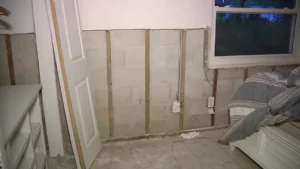Easing regulation to ease rebuilding

One of about 200 homes in Gulfport, Florida damaged in the hurricanes awaiting permits to begin repairs as of January 2025. Source: WTVT-TV, Fox 13 Tampa
The 2024 hurricane season brought ongoing problems for communities impacted by Hurricanes Debby, Helene, and Milton that still persist months after the storms subsided. Resiliency on the local level is perhaps the greatest imperative in the rebuilding process, and when communities are fiscally or legally constrained, it can be almost impossible for them to get back on their feet. Enter HB 1535, filed in the Florida House of Representatives last month, which hosts a wide range of changes to emergency response including tenants’ rights, replacement structures, medical care, shelters, and comprehensive plans for all issues that may arise in the wake of a disaster.
Bill sponsor Rep. Fiona McFarland (R– Sarasota) centered the proposal around feedback from those directly affected by the barrage of storms last year. “It’s feedback from the Realtors. It’s feedback from homeowners’ associations, from builders, from environmentalists, emergency managers, and all of that is boiled into this bill,” she told the House Natural Resources & Disasters Subcommittee last week. The subcommittee unanimously approved the bill, which has two more committee stops before going to the House floor.

Hurricane Helene debris outside of a St. Petersburg business on September 28, 2024. Courtesy, Pinellas County Sheriff’s Office
For starters, the bill would prohibit counties from imposing moratoriums on rebuilding under disaster declarations from Hurricanes Debby, Helene and Milton and stop governing bodies from imposing impact fees if rebuilding doesn’t change land-use designations. Rebuilding can also be up to a 130% larger footprint than the pre-hurricane homesteads under the proposal, allowing for home elevation that often requires it, be it a new external staircase or more space for utilities.
The bill also calls for state agencies to work alongside local governments to streamline permitting for repair and rebuilding of damaged homes and businesses. Federal hurdles have been a problem cited in the aftermath of 2022’s Hurricane Ian in southwest Florida, where only now Sarasota residents are finally getting the relief and federal disaster money two and a half years later.
The bill also addresses shelters used in evacuations. It requires the Florida Division of Emergency Management (FDEM) to conduct a study on statewide shelter needs, including ample resources to care for those with developmental disabilities and availability for pets. FDEM would also be required to coordinate debris removal in Florida’s fiscally constrained counties that often don’t have the resources. One of the more publicized moments of the 2024 hurricane season − a crane collapse into a St. Petersburg office building – is directly addressed, with HB 1535 requiring all hoisting equipment to be secured 24 hours before anticipated storm impacts, including setting crane towers in a “weathervane position.”

